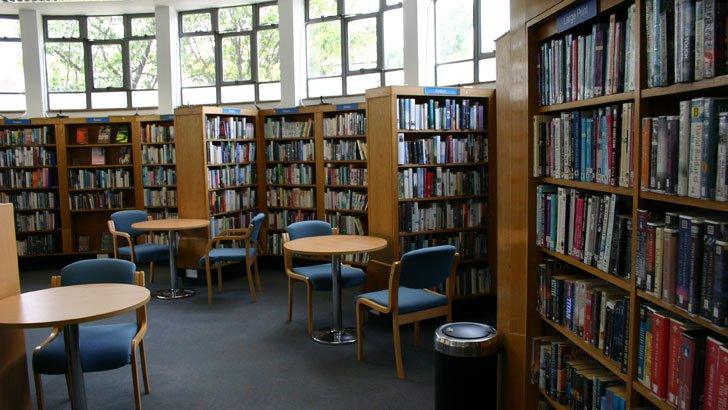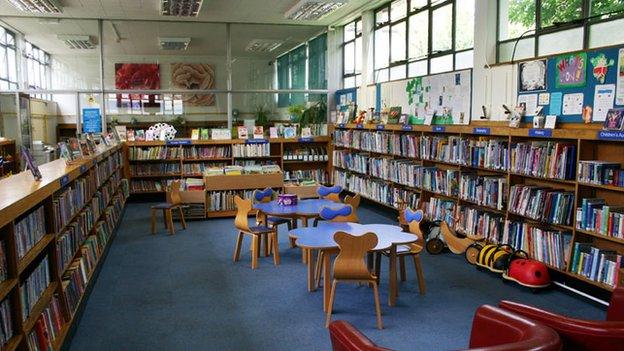The volunteers who are keeping local libraries alive
- Published

More than 300 UK libraries closed between 2010 and 2014
Local libraries are increasingly relying on volunteers to run them. But are "community libraries" a step forward or a regressive stopgap?
With local authorities across the country facing a budget squeeze, library services have been put under increasing pressure. The number of full-time librarians across the UK has fallen by nearly a fifth in the past four years and hundreds of libraries have closed.
At the same time, the number of volunteers working in libraries has doubled, and in some places they have saved their local library from closing its doors for good.
Armthorpe library in Doncaster is one of these so-called "community libraries." It is in the same building which has served their community for generations.
It is bright and light and clean. The shelves are neatly stacked with books and desks with computers line the walls.
The books and the building are provided by Doncaster council, but the staff here are almost all volunteers.
Stewart Marks is retired. But he works, unpaid, to provide a service to the public and is proud of what has been achieved over the past year.
"I think we provide a very professional service, possibly even better than when it was library staff because there are more of us," he said.
"We don't have all the back room tasks to do, so we can concentrate on giving an even more professional service to our customers."
In Doncaster, 19 of Doncaster's 24 libraries are now community services. Professional, council-employed staff provide a support role, but the volunteers are now central to the service.
They open the building each day, stack the shelves, order stock and staff reception. They also do the cleaning.

The number of books lent fell by 20% over the same period
The council makes it clear that without the volunteers, this and other libraries might have been shut down.
But it also says the community library programme, now in its fourth year, has moved well beyond a question of survival.
"We are talking about libraries really flourishing in a much more business-savvy environment," says Nick Stopforth, Doncaster's head of libraries.
"That's the volunteers, the community making that happen."
But what about the service? Jackie has come to the library to pick up a specific book she requested and is taken by a volunteer to the shelf where the book is ready for her to collect.
"I think they do a fabulous job and they are so helpful when you come in to pick up a book," she says.
"They make you a cup of tea and you can have a sit-down, they lend you pens and anything you want they will get for you."
A pair of female college students who are using the computers to research course work are also impressed.
"The staff here are always so helpful and so nice," says Louise. " If they don't have a book they will order it in for you, so you don't have to travel to any other library."

Library closures
Between March 2010 and March 2014:
337 libraries have closed in the UK - a fall from 4,482 to 4,145
Number of volunteers has increased 100% - from 17,550 to 35,818
Number of full-time staff has decreased by 22% - from 24,746 to 19,308
Number of books lent has fallen by 20% - from 309 million to 247 million
Source: CIPFA (Chartered Institute of Public Finance and Accountancy)

Lincolnshire is one of the latest councils planning to use volunteers to staff its libraries. But protestors are warning that unpaid staff cannot take the place of professional librarians, and that services will suffer.
Julie Harrison, a former head teacher, is a leading figure in the Save Lincolnshire Libraries campaign. "It's not that we don't applaud these volunteers, we are very very grateful to them," she says.
"But they need to be there in addition to paid library staff working in libraries that are local authority run."
The Ermine Library in Lincoln is among those the council proposes to run with volunteers. But some who use the service are unsettled by the idea of such a major change.
"I have always been a member of this library and I think they should find some other way of keeping them open," said Barbara, who has been using the library for four decades.
"It would totally undervalue the service [to have it run by volunteers]," said another visitor. "And it is a very, very valuable service for the computer side and the book side. It is a regressive step."
The council seems determined to press on with its plans. Of Lincolnshire's 45 libraries, it has planned to hand over 30 to voluntary staff, starting in September.
Councillor Nick Worth (Cons) said that there is a stark choice between changing the way libraries are run and, potentially, losing them.
"I think this is a really sensible solution which keeps libraries open," he says. "We have to make changes as we have to make savings.
"I think the libraries in the future will be as good, if not better."